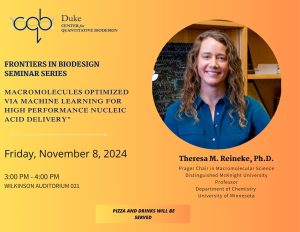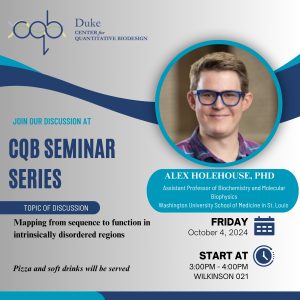
Join the Duke Center for Quantitative Biodesign on Friday, April 18, 2025 as we welcome our last guest speaker for the Spring 2025 semester, Dr. Bowen Li, where he will be discussing ” AI-Driven Design of Lipid Nanoparticles for mRNA Delivery.”
Bio: Bowen Li is an Assistant Professor at the Leslie Dan Faculty of Pharmacy, University of Toronto, and an Affiliate Scientist at the Princess Margaret Cancer Centre. He holds the Tier 2 Canada Research Chair in RNA Vaccines and Therapeutics and the GSK Chair in Pharmaceutics and Drug Delivery. Dr. Li earned his Ph.D. in Bioengineering from the University of Washington in Seattle and completed a postdoctoral fellowship under Profs. Bob Langer and Daniel Anderson at MIT. His lab employs interdisciplinary approaches—including biomolecular engineering, combinatorial chemistry, autonomous high-throughput platforms, and machine learning—to develop next-generation delivery systems for nucleic acid medicines. Dr. Li’s work has resulted in over 60 publications in leading journals such as Nature Biotechnology, Nature Materials, Nature Biomedical Engineering, Nature Medicine, Nature Communications, PNAS, and Science Advances, as well as ten patents. His research has been recognized with numerous prestigious awards, including the AAPS Emerging Leader Award, Biomaterials Science Emerging Investigator Award, CSPS Early Career Award, Cystic Fibrosis Canada – Marsha Morton Early Career Investigator Award, ACS Rising Star in Biological, Medicinal, and Pharmaceutical Chemistry, Gairdner Early Career Investigator Award, J.P. Bickell Medical Research Award, and Connaught New Researcher Award.
Abstract: Achieving effective functional delivery to specific cell types within targeted tissues is critical for unlocking the therapeutic potential of nucleic acid medicines. Despite significant advancements in mRNA vaccines, the optimal chemical and formulation composition of lipid nanoparticles (LNPs) for extrahepatic nucleic acid delivery remains poorly understood. Traditional approaches to lipid and formulation development are hindered by the complexity of biological systems and a lack of comprehensive historical data. In this talk, I will present an AI-driven self-driving laboratory (SDL) developed to overcome these challenges. At the core of this platform is a molecular foundation model utilizing few-shot learning to efficiently explore vast chemical spaces for designing ionizable lipids and predicting their suitability for assembling into LNPs for mRNA delivery. The SDL combines automated high-throughput synthesis and screening of thousands of chemically diverse lipid-like materials, enabling the discovery of structure-function relationships critical to improving mRNA delivery performance. This AI-driven approach identified potent LNPs with exceptional mRNA transfection efficiency, validated in vitro and in vivo, showcasing the platform’s potential to advance delivery systems and thus facilitate the development of nucleic acid therapeutics.








This fall break, the Duke Center for Quantitative Biodesign (CQB) hosted our 3rd Annual Symposium, highlighting the innovative role of AI in Biodesign. A huge thank you to everyone who attended, and special thanks to our keynote speakers: Mary Dunlop (Boston University), Kevin Yang (Microsoft for Startups, César de la Fuente, PhD (University of Pennsylvania), Philip Romero (Duke University Pratt School of Engineering) Caleb Bashor (Rice University Department of Bioengineering), Tom Sercu (EvolutionaryScale) , Matt Pavlovich (Trends in Biotechnology), & Rohit Singh ( Duke University School of Medicine) their incredible presentations.
We’d also like to congratulate our poster session winners:
First Place: Lauren Hong
Runner-Ups: Nathaniel Blalock and Jennifer Hennigan
A heartfelt thanks to the symposium committee for their help in organizing and facilitating such a successful event. We thoroughly enjoyed connecting with all of you and look forward to more exciting discussions and collaborations next year!